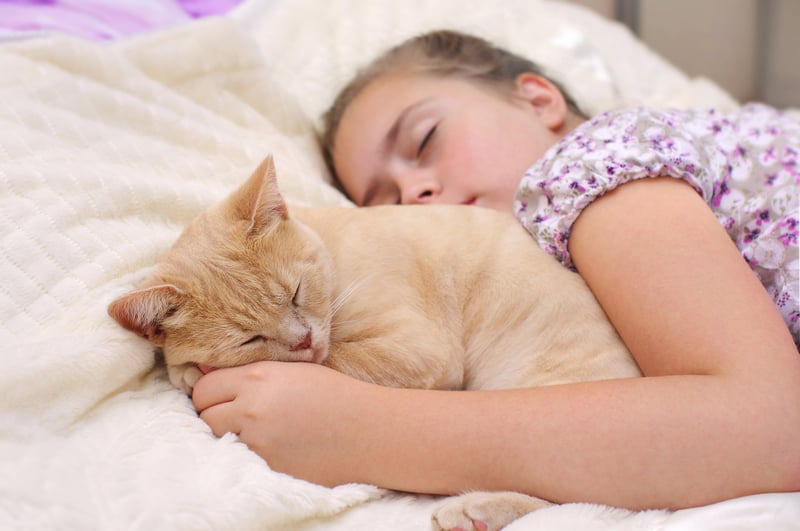Get Healthy!

- Cara Murez
- Posted March 17, 2023
Pets in the Bedroom? Your Sleep Might Suffer, Study Finds
If your bedtime routine includes snuggling up with your Boston terrier or lulling yourself to sleep to the gentle purrs of your calico cat, you might want to rethink it.
Pets can offer a sense of security and comfort, but sharing a bed with them may lead to wakeful nights, according to a new study.
It found that dog owners were more likely to have a sleep disorder and trouble sleeping. Cat owners had greater odds for having leg jerks at night.
Anecdotally, some have had those experiences, including study leader Lauren Wisnieski, an assistant professor of public health and research at Lincoln Memorial University in Harrogate, Tenn.
"I have a dog and a cat,"she said. "It definitely disrupts my sleep."
While the new research doesn't prove that pets caused the sleep issues identified or even that they were sleeping in their owners' beds rather than wandering the house at night, it does point to a link.
To learn more, Wisnieski and her colleagues used data from a nationwide health survey conducted in 2005 and 2006.
They looked at sleep factors including feeling unrested, not getting enough shut-eye, taking longer than 15 minutes to fall asleep and averaging less than six hours of sleep a night.
After controlling for variables such as age and marital status that could affect sleep quality, researchers found that dog owners were more likely to have sleep apnea and other sleep disorders. A greater percentage needed medication to sleep and woke feeling unrested, the study found.
Cat owners, meanwhile, were more likely to snore and have leg jerks. They also were more likely to have trouble falling asleep and staying asleep.
Wisnieski suspects the reason for differences between dog owners and cat owners may be that cats tend to be more active at night.
The study found fewer differences in sleep quality between people with and without cats than it did between people with and without dogs.
Of course, there's a trade-off for the wakeful nights. Pets may also offer a sense of security that eases anxiety, stress and depression, the researchers pointed out.
"Pets have a very positive effect on mental health and depression, and they offer a sense of social support, too, so there's many positive benefits of having a pet,"Wisnieski said. "But, obviously, there can be some cons if they're taking up room on the bed and disrupting you as they get in and out of bed."
Keeping them out of the bedroom is, Wisnieski said, easier said than done.
Dr. Sanjeev Kothare, a sleep expert and pediatric neurologist at Cohen Children's Medical Center in Queens, N.Y., reviewed the findings.
He noted that having a dog in bed can be sometimes helpful -- for instance, calming someone with autism. But sharing a bed -- be it with pet or person -- can also disrupt sleep, he added.
"We don't recommend even a kid co-sleep with a parent in a bed because when the parent moves, the kid wakes up [and] when the kid moves, the parent wakes up,"Kothare said.
Sleep is, of course, essential to good health.
"You sleep because you want to recharge your battery. Your brain needs to be recharged. All the free radicals that are present in the brain have to be "¦ washed away,"Kothare said. "Sleep also regulates the temperature of the body. Sleep consolidates memory and learning."
And, he added, if you don't sleep well, you have a higher risk for diabetes, high blood pressure, high cholesterol, strokes, heart attacks and what's known as metabolic syndrome.
"All those things are important,"he said.
Kothare offers some tips to help people fall asleep and get good slumber once they do:
- Keep your bedroom cool.
- Avoid bright light in the evening, especially blue light from screens.
- Don't nap in the afternoon.
- Try to avoid disturbing content or deep thoughts in the late evening.
- Don't exercise just before bedtime.
- Avoid caffeine after 3 p.m.
The study results are preliminary, so Wisnieski said she wouldn't widely recommend people keep their pets out of their bedrooms, especially if they have a strong attachment.
"But on an individual level, if you're having trouble sleeping, something that you might consider trying is separating your pet from your bed or your bedroom,"Wisnieski advised.
The findings were published March 17 in the journal Human-Animal Interactions.
More information
The Sleep Foundation has more on having pets in bed.
SOURCES: Lauren Wisnieski, PhD, assistant professor, public health and research, Lincoln Memorial University, Harrogate, Tenn.; Sanjeev Kothare, MD, sleep expert and pediatric neurologist, Cohen Children's Medical Center, Queens, N.Y.; Human-Animal Interactions, March 17, 2023







